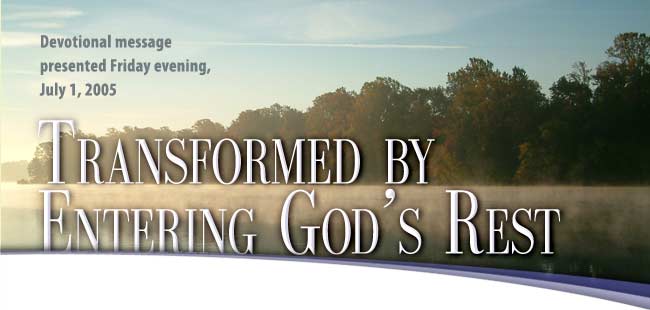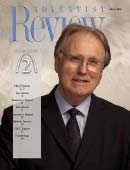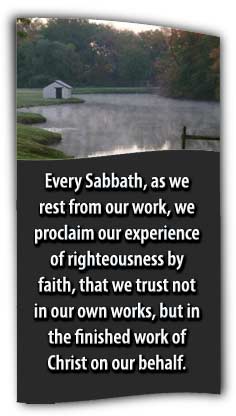 |

Richard M. Davidson This evening I remind you of a group of powerful and prominent leaders in the Bible. Because they were so prominent in Israel's history, you will no doubt recognize their names: Shammua, Shaphat, Igal, Palti, Gaddiel, Gaddi, Ammiel, Sethur, Nahbi, and Guel. In fact, I have yet to find a group of Adventists who can identify these names as I read them, until I add the last two names on the list: Caleb and Joshua (Hoshea). Yes, these are the names of the 12 spies sent out by Moses under the command of God to survey the Land of Promise (Num. 13:4-16).* Ten leaders were a dismal failure, dragging a whole generation down with them, while Caleb and Joshua were paragons of victory and success. On Canaan's borders God had promised Israel through Moses, "For as yet you have not come to the rest [Hebrew menuchah] and the inheritance which the Lord your God is giving you. But when you cross over the Jordan and dwell in the land which the Lord your God is giving you to inherit, and He gives you rest [Hebrew nuah] from all your enemies round about, so that you dwell in safety" (Deut. 12:9, 10). Reliving the Story The people of God had entered His rest! True, they had many battles yet to fight before they would actually possess the land in its fullness; yet in a real sense the promise of rest in the land of milk and honey was being fulfilled as they trusted in God's promise. But the story of Joshua leading Israel into God's rest is not just a story of a people long ago and far away. It is our story as well.
In Genesis 2 God rested by ceasing from his works on the Sabbath, and He invited Adam and Eve to rest on that first Sabbath. From what were Adam and Eve resting? From their own works? No, they were resting in God's finished work. Thus even before sin there is a profound inference of the principle of righteousness by faith. And Paul draws the implication for believers in his day: "There remains therefore a rest [sabbatismos, Sabbath rest] for the people of God. For he who has entered His rest has himself also ceased from his works as God did from His" (Heb. 4:9, 10). Every Sabbath, as we rest from our work, we proclaim our experience of righteousness by faith, that we trust not in our own works, but in the finished work of Christ on our behalf. The Sabbath becomes the outward sign of the "rest of grace" (Seventh-day Adventist Bible Commentary, vol. 7, p. 928) that believers in Christ may experience all week long. Rest in Christ As a young pastor I preached sermons full of Christ, yet devoid of the assurance that we could rest in Him. But through a chain of marvelous, providential leadings, the simplicity and beauty of the gospel began to dawn before me. I was "surprised by joy" with the clear scriptural testimony that I could have the assurance of entering His rest: "Most assuredly, I say to you, he who believes in Me has everlasting life" (John 6:47). "These things I have written to you who believe in the name of the Son of God, that you may know that you have eternal life" (1 John 5:13; cf. verses 11, 12). "Come to Me, all you who labor and are heavy laden, and I will give you rest" (Matt. 11:28). The message of confidently resting in Christ's righteousness does not lead to cheap grace. Rather "its fruit is unto holiness" (Selected Messages, book 1, p. 359; cf. Rom. 6:22). Only as I trust wholly in the merits of Christ, my substitute and surety, can I truly obey God in the spirit as well as the letter of the law. Other Dimensions of Sabbath Rest I have found seven dimensions of Sabbath rest highlighted by the various Hebrew verbs in the books of Moses. As we welcome the Sabbath, I invite you to contemplate this multifaceted rest. We have already spoken of the spiritual rest.
The fourth commandment also indicates that God rested mentally as well as physically. The verb for "rest" used here is not shabbat, as in Genesis 2, but nuach; it means to "be tranquil, in a state of repose and peace." After creating in six days, God sat back in tranquil repose, mentally rejoicing in the world He had created. On Sabbath He invites us to join Him in that sense of restful repose and peace. Exodus 31 adds a fourth dimension of Sabbath rest where it says God "was refreshed" (verse 17). The verb literally means He "took on new soul or life" (nephesh). Even though God was obviously not tired, He took on new life; He experienced emotional rest. On Sabbath God longs to recharge our emotional batteries, to refresh and restore our souls. A fifth dimension of Sabbath rest is creative, celebratory rest. In Exodus 31 God pronounced: "The children of Israel shall . . . observe the Sabbath throughout their generations" (verse 16). We are to "make" the Sabbath-as God made the heavens and the earth-with all the creativity and energy that God displayed in His creative process. This verse in the New International Version captures the meaning by using the word "celebrating" instead of merely "observing" the Sabbath. God offers us on the Sabbath a chance to exuberantly celebrate His goodness. The sixth dimension of the Sabbath is that it is filled with power. In Hebrew thought, for God to bless something is to empower it to fulfill the function for which it is designed. That sabbatic empowerment spills out into all the other days of the week. The seventh dimension of Sabbath rest is captured in the words "God blessed the seventh day and sanctified it [or made it holy]" (Gen. 2:3). How does God make something holy? By His presence. The gift of Sabbath rest is not just the gift of a day, but the gift of a Person, filling the day with His loving presence. The Heavenly Sanctuary and Rest Thus it's no wonder that in the epistle to the Hebrews, immediately after mentioning the Sabbath rest in Hebrews 4, the author invites us to "come boldly to the throne of grace [in the heavenly sanctuary, God's "resting place"], that we may obtain mercy and find grace to help in time of need" (verse 16). This is not just a metaphor for prayer. We are invited to actually come to the throne of grace in the heavenly sanctuary by faith. Three more times in the Epistle this invitation is given: Hebrews 6:19, 20; 10:19-22; 12:22-24. Four times we are invited now, by faith, to enter God's rest (i.e., his "resting place") in the heavenly sanctuary. These passages repeatedly call us to consider that we actually come by faith into the heavenly sanctuary in the heavenly Jerusalem. In these passages there is a call to more than metaphorical lip service to the sanctuary doctrine. This is what I like to call an invitation to "sanctuary life." When faced with difficulties, whatever the pressures of life, you can enter God's rest. The "rest of grace" is the source of "mercy and . . . grace to help in time of need" (Heb. 4:16); it is "an anchor of the soul" (Heb. 6:19); it is connected with the privilege of "having our hearts sprinkled from an evil conscience and our bodies washed with pure water" (Heb. 10:22); it is vitally linked with joyous celebration and worship in the presence of "an innumerable company of angels" (Heb. 12:22). In a word, Jesus, the New Joshua, makes available to us the antitypical fulfillment of all that was implied in God's rest in the history of ancient Israel. We can come by faith to the heavenly Canaan (Heb. 12:22-24); we conduct spiritual warfare against our spiritual enemies (Eph. 6:10-17); and receive our spiritual inheritance (Acts 20:32; Eph. 1:11, 14, 18); and, praise God, we enjoy the spiritual rest of grace in His presence (Heb. 4:9-11). What is ours to enjoy now, as a faith experience of entering
God's rest, will one day reach its ultimate fulfillment in connection with the
Second Advent and beyond. The author of Hebrews points to God's "rest"
not only as a present experience but as a future hope: "Let us therefore
be There will be a final, literal conquest of the enemies of God.
We will enjoy our ultimate inheritance (Matt. 25:34; Col. 3:24; Rev. 21:7).
And yes, we will enter God's glorious, eternal rest. May that day come soon!
Amen. |
 |
 |

 Entering God's Rest
Entering God's Rest A second facet God offers us is physical rest. On the seventh
day of creation week God "rested . . . from all His work which He had done"
(Gen. 2:2). The verb for "rest" used here is shabbat, which
means "to pause, to cease." In the fourth commandment we are invited
to follow God's example, to pause, cease from our weekday work.
A second facet God offers us is physical rest. On the seventh
day of creation week God "rested . . . from all His work which He had done"
(Gen. 2:2). The verb for "rest" used here is shabbat, which
means "to pause, to cease." In the fourth commandment we are invited
to follow God's example, to pause, cease from our weekday work.